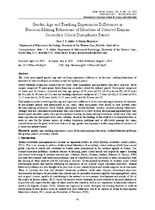Gender, age and teaching experiences differences in decision-making behaviours of members of selected Kenyan secondary school disciplinary panels
Abstract
The study investigated gender, age and teaching experiences differences in decision- making behaviours of
members of selected Kenyan secondary school disciplinary panels.
Mixed Methods design was adopted for the study. Both quantitative and qualitative data were collected. Study
sample comprised 78 participants drawn from ten secondary school disciplinary panels. Participants comprised
45 males and 33 females, clustered into four age groups of-29 years (n=21), 30-39 years (n=28), 40-49 years
(n=14), and 50-59 years (n=15); and six teaching experience categories of 1-5 years (n=33), 6-10 years (n=14),
11-15 years (n=5), 16-20 years (n=6), 21-25 years (n=8), and 26-30 years (n=12).
Data analysis results revealed gender, age and experience differences in decision-making behaviours of members of disciplinary panels who participated in the study. Male participants were found to tend towards risky decision-making behaviours while female participants tended towards cautious decision-making behaviours.
Younger and less experienced participants were also found to be risky in their decision-making behaviours also
tended panel members made risky pre-disciplinary hearing decision-making behaviours, while their older and
more experienced counterparts were more cautious. Based on the findings of this study it is recommended that, in order to cater for the diverse nature of student behaviour problems and to effectively manage the same,
consideration must be given to delicate balance of age, gender and experience in the composition of members of
a school disciplinary panel.

